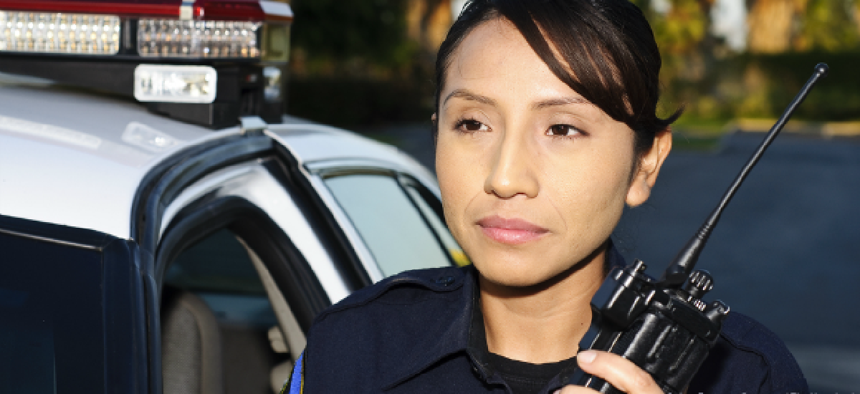App gives police access to oft-used info, unclogging 911 dispatch centers


Connecting state and local government leaders
Badge Buddy cuts down on officers' reliance on dispatchers for relaying of noncritical information, saving time, improving efficiency.
What many people don’t realize about how the police operate is how long it can take for officers in the field to get essential, but fairly mundane, information. The time spent having dispatchers in 911 centers arrange for tow trucks or verify information from another jurisdiction quickly adds up. Eliminating the middle man by giving officers in the field direct access to local, public information is the goal of a new mobile app called Badge Buddy.
Badge Buddy app

The app includes a variety of resources, including contact information for federal, state and local agencies.
Developed by someone who was himself once a 911 dispatcher, the app has already garnered attention. Available for just six months, it was named a top 30 finalist for the 2014 Igniting Innovation Awards that will be presented by the American Council for Technology-Industry Advisory Council (ACT-IAC) on February 6 in Washington, D.C.
“The idea of the app itself was an aha moment, but the concept for it came to me years ago,” said Jeff Godin, president and chief executive of Badge Buddy, the company that developed the app. “When I was dispatching, officers on the street would be constantly calling in for information about the same things, such as the number for a tow truck company or the location of a firehouse. I realized that if you could give them direct access to the information that would really streamline the process.”
As well as the kind of local information officers need daily, the app also contains information such as state laws they can look to when writing traffic tickets. Currently, police officers would probably have to flip through a printed book for that information, which may even be out of date because traffic laws change frequently. With Badge Buddy, they have access to up-to-date information on their smartphones with just a few taps.
Badge Buddy would have helped Jess Bell, an alternate supervisor at the Chester County, Pa., 911 center during the recent polar vortex weather system that put much of the Midwest and eastern United States into a deep freeze and sent cars spinning off the roads. Bell was working in the dispatch center, answering calls from officers on the street who were constantly calling the center to get tow trucks for them. The more tow trucks she had to call the longer the wait time grew, which jammed up the system. With Badge Buddy, she said, the officers would have had all of the tow truck numbers on their smartphones.
“I won’t say it’s not my job to call tow trucks for them, or to find the number of the fire company so they can know who the ambulance crew will be at a scene, or to get the number of the local FBI office so the officers can get information about bank robberies in the area,” she said. “It absolutely is, but there are more important things to the job, so if they can find the numbers for themselves, it frees me up to help them with things they can’t do faster.”
Bell worked with Godin, and she helps with the testing of Badge Buddy features.
The app will also help with bridging the information gap between local, county, state and federal agencies, Godin said. When he worked as a dispatcher the county had 73 townships and municipalities and, if something happened right on the border of jurisdictions, it could take hours for communications to bounce from officer to dispatcher, from there to the next county’s dispatcher and then back to the officer.
There’s also a major complication with part-time police departments, he said. When they are off work in the middle of the night the state police cover for them, but sometimes the state “is not very open about what has been going on.” That means the part-time police officers may not be able to get up-to-date until they get into work the next day. With Badge Buddy, dispatchers could update the app as information eventually reaches them and the officers would have that as soon as they woke up.
The app, which is available for both Apple’s iOS phones as well as Android devices, also has the ability to push information to users, on demand.
All the information contained in the app is public, Godin said, though plenty of what is available isn’t very accurate so a lot of his time is spent verifying information. However, he’s also working on ways to provide access through the app to more sensitive information. He’s even developing ideas for using some of the newer smartphone features, such as the fingerprint sensor included with the iPhone 5s, to enable that.
Since its August 2013 launch, Badge Buddy has gained close to 1,000 regular users, Godin said. Those are mostly individuals so far, as he quickly found that his original idea to sell Badge Buddy to the agencies themselves would go nowhere since local police departments, “just don’t have the money.”
He’s also constrained by the fact that app development is down to just himself, so far, and he can’t keep up with the changes that are needed. But he’s hoping that the ACT-IAC award program will be the beginning of a broader recognition that creates enough interest to draw others into helping with development.

NEXT STORY: DC transforms social media site with citizen-service analytics




